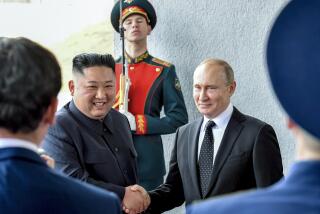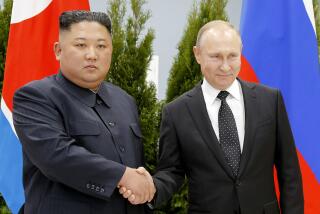Wary Eye on N. Korea
- Share via
In a further step to end its diplomatic isolation, North Korea has invited Secretary of State Madeleine Albright to Pyongyang next week and promised her a meeting with its formerly reclusive but now increasingly accessible leader, Kim Jong Il. This will be the highest-level visit by a U.S. official since the People’s Democratic Republic of Korea was proclaimed in 1948. Its purpose is to try to build on last week’s groundbreaking talks in Washington between President Clinton and a top advisor to Kim. This is the kind of work that secretaries of State are hired to do. But more may be planned. Officials indicate that a productive Albright visit could lead fairly quickly to one by Clinton. Policymakers should ponder that possibility with great skepticism.
The issue isn’t that Washington is interested in improving a relationship that has been unremittingly hostile since the United States went to war to repel North Korea’s invasion of South Korea in 1950. The issue is timing, and reciprocity. Pyongyang may have dropped the menacing scowl it directed at the outside world for so long, as desperation produced by a shrinking economy and famine has driven it to seek diplomatic relations with potential Western benefactors. But softer words have yet to be accompanied by the kind of substantive changes that would evidence a true change in direction.
For most countries a visit by the president of the United States remains a coveted event, a conferral of status and inferred if not intended approval. North Korea has done nothing to earn such a gift. It remains on the U.S. list of states involved in terrorism. It has violated international agreements with its transfers of nuclear and missile technology to such countries as Iran, Iraq and Pakistan. Its dealings with the United States are based not on good faith but nuclear extortion, to which Washington has cravenly acceded. At home, Kim runs one of the world’s cruelest and most repressive police states.
It would be wrong for Clinton to lend legitimacy to Kim and his regime, in the absence of agreements and actions that would unmistakably show North Korea is moving to reduce tensions in Northeast Asia, live up to international norms and improve its shameful human rights policy. Clinton has just a few months left in office. But he remains the president, and what he does in these final days could set the tone for U.S. policy for some time to come. A healthy and merited wariness is still the safest way to approach Stalinist North Korea.
More to Read
Sign up for Essential California
The most important California stories and recommendations in your inbox every morning.
You may occasionally receive promotional content from the Los Angeles Times.













